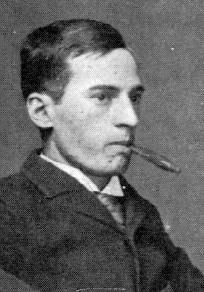Harry Nelson Pillsbury
Harry Nelson Pillsbury
Harry Nelson Pillsbury (December 5, 1872 – June 17, 1906) was an American chess player. He was born in Somerville, Massachusetts and became one of the leading chess players in the world during the late 19th century.
Early Life[edit | edit source]
Pillsbury showed an early aptitude for chess and quickly rose through the ranks of the Boston chess scene. He gained recognition for his exceptional talent and was soon competing in national and international tournaments.
Chess Career[edit | edit source]
Pillsbury's breakthrough came in 1895 when he won the prestigious Hastings Chess Congress in England, ahead of several world-class players. This victory established him as a serious contender for the world championship.
In 1896, Pillsbury participated in the famous Nuremberg Chess Congress where he finished second behind the reigning world champion, Emanuel Lasker. Despite this loss, Pillsbury's performance was highly praised, and he continued to impress the chess world with his innovative and aggressive playing style.
Pillsbury's most notable achievement came in 1899 when he won the elite Paris International Chess Tournament, defeating many of the top players of his time. His victory solidified his reputation as one of the strongest chess players in the world.
Legacy[edit | edit source]
Harry Nelson Pillsbury's contributions to chess are widely recognized, and he is remembered as one of the most talented players of his era. His games are studied by chess enthusiasts and his strategic ideas continue to influence modern players.
References[edit | edit source]
- David Hooper and Kenneth Whyld, The Oxford Companion to Chess (1992)
Search WikiMD
Ad.Tired of being Overweight? Try W8MD's physician weight loss program.
Semaglutide (Ozempic / Wegovy and Tirzepatide (Mounjaro / Zepbound) available.
Advertise on WikiMD
|
WikiMD's Wellness Encyclopedia |
| Let Food Be Thy Medicine Medicine Thy Food - Hippocrates |
Translate this page: - East Asian
中文,
日本,
한국어,
South Asian
हिन्दी,
தமிழ்,
తెలుగు,
Urdu,
ಕನ್ನಡ,
Southeast Asian
Indonesian,
Vietnamese,
Thai,
မြန်မာဘာသာ,
বাংলা
European
español,
Deutsch,
français,
Greek,
português do Brasil,
polski,
română,
русский,
Nederlands,
norsk,
svenska,
suomi,
Italian
Middle Eastern & African
عربى,
Turkish,
Persian,
Hebrew,
Afrikaans,
isiZulu,
Kiswahili,
Other
Bulgarian,
Hungarian,
Czech,
Swedish,
മലയാളം,
मराठी,
ਪੰਜਾਬੀ,
ગુજરાતી,
Portuguese,
Ukrainian
Medical Disclaimer: WikiMD is not a substitute for professional medical advice. The information on WikiMD is provided as an information resource only, may be incorrect, outdated or misleading, and is not to be used or relied on for any diagnostic or treatment purposes. Please consult your health care provider before making any healthcare decisions or for guidance about a specific medical condition. WikiMD expressly disclaims responsibility, and shall have no liability, for any damages, loss, injury, or liability whatsoever suffered as a result of your reliance on the information contained in this site. By visiting this site you agree to the foregoing terms and conditions, which may from time to time be changed or supplemented by WikiMD. If you do not agree to the foregoing terms and conditions, you should not enter or use this site. See full disclaimer.
Credits:Most images are courtesy of Wikimedia commons, and templates Wikipedia, licensed under CC BY SA or similar.
Contributors: Prab R. Tumpati, MD

